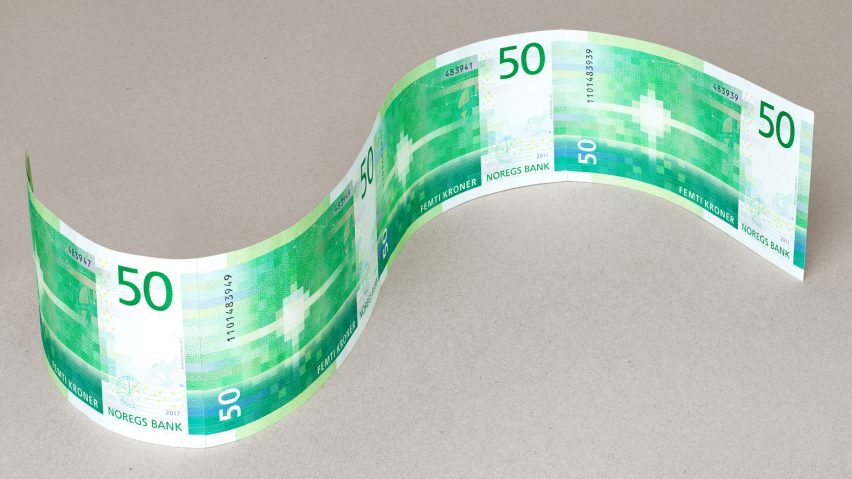Norway has put new 50 and 500 kroner banknotes into circulation, featuring pixelated images of Norwegian coastlines designed by architecture studio Snøhetta.
Snøhetta's unconventional design was selected by the Central Bank of Norway in 2014 to front the nation's new banknotes. The 50 and 500 kroner notes have now been released, after four years of development, joining the 100 and 200 notes released in 2017.
This is Norway's eighth banknote series, but the first where the main designs are not portraits of people.
Snøhetta created five different motifs for the country's 50, 100, 200, 500 and 1000 kroner banknotes, coloured respectively in green, red, blue, orange and purple.
Each of the mosaic-like illustrations, which only appear on one side of each note, are designed to reflect the beauty of the characteristic Norwegian coastline, which is the longest in Europe.
On the other side of each banknote is a design by Oslo-based graphics studio Metric Design and illustrator Terje Tønnesen, featuring more traditional images of fish, sailing vessels and waves.
Snøhetta's concept was to represent "the boundaries between sea and land, between land and air and between air and sea."
"By linking the coastline metaphor with a graphical expression inspired by ancient mosaic artefacts of coloured glass or stone, the designers have translated this analogue art form into the mosaics of our time: the pixels," said the studio.
"In this sense, the design represents boundaries as a travel in time: a travel between old and new, past and present."
Varying for each banknote, the different pixelated patterns make reference to the Beaufort scale – an empirical scale used for measuring wind speeds based on observed sea conditions.
On the 50 kroner note, for instance, the wind is gentle, represented by a dense cubic configuration overlaid with a subtle undulating wave pattern.
In contrast, the 500 kroner note illustrates a strong wind, expressed through elongated rectangles patterned with shorter, choppy waves.
"Banknotes are symbols of a nation. Through its wide distribution and rapid switching of hands, with 124,200,000 banknotes in circulation in Norway just last year, the banknotes are perhaps the most social design of our time," said Snøhetta.
"The banknotes connect people and create value as people meet to exchange them – a value that far outweighs the note's material worth," it added.
Each of the banknote designs was adapted by the Central Bank of Norway to adhere to strict security measures.
The banknote collection will be completed towards the end of 2019, when the 1000 kroner note will be put into circulation.
"While the final release will mark a new and fresh start for the entire banknote collection, the release could also be the end of an era as the notes could well be Norway's last paper currency before stepping into a future of digital-only currency and exchange," added the studio.
Snøhetta is led by architects Craig Dykers and Kjetil Trædal Thorsen, with offices in New York and Oslo. The firm is best known for architecture projects including the Oslo Opera House and the SFMOMA extension.

